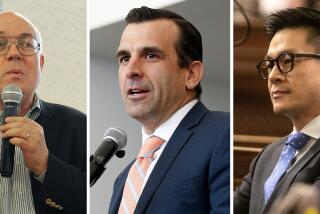Coleman vs. Franken winds down in court
- Share via
FORT WAYNE, IND. — It is the election that never seems to end.
Voters in Minnesota were no closer Wednesday to knowing whether their second U.S. senator will be Democrat Al Franken or Republican Norm Coleman, even as the latest installment, a trial in St. Paul challenging the Nov. 4 election, comes to a close.
It’s been a bitter battle to figure out whether Franken’s narrow lead -- 225 ballots over incumbent Coleman, out of 2.9 million cast -- is the actual, final result of the race.
“We have been through a canvass, a hand recounting, a state canvassing board hearing, a seven-week trial and several trips to the state Supreme Court,” said Franken attorney Marc Elias. “When I landed in Minneapolis on Nov. 7, I never imagined it would last this long.”
Even Mother Nature is dragging things out: Heavy snowstorms prevented at least one witness from reaching court this week, prompting the Franken legal team to say they would rest their case today if they could still submit exhibits.
Attorneys for Coleman, who brought the challenge, are preparing lists of rebuttal witnesses. A lawyer for voters whose absentee ballots were rejected also may appear.
The public is understandably weary. Some Minnesotans simply want the mattered settled, one way or the other. They’re concerned that their state could lose out on federal aid with only one senator.
“This is a very important time to have everybody there, with the way the economy is,” Jared Reise of suburban Eagan, Minn., told the Associated Press. “It’s a little long-winded, this whole recount.”
Both major parties have a stake in the fight over the seat. If Franken wins, Democrats will have a 59-seat majority -- one vote short of filibuster-proof control in the Senate. Republicans want to keep them from getting that advantage.
“For the Republicans, if they can’t get Coleman into office, then keeping that office vacant is just as good,” said David Schultz, an election law professor at Hamline University in St. Paul. “As long as the Democrats don’t have that 59th vote, and the longer they have to swing two GOP votes instead of one, it works to [Republicans’] advantage.”
The day after election day, Coleman was 725 votes ahead. As late returns came in and election-night tallies were revised, that lead shrank. But going into the hand recount, Coleman was still in the lead by more than 200 votes.
When Minnesota’s canvassing board certified Franken as the winner in January based on the recount, Coleman filed a lawsuit alleging that Minnesota’s flawed election system had lost him the seat.
The key to Coleman’s case was the nearly 4,800 absentee ballots that, according to his lawyers, were improperly rejected. A judicial panel order limited the categories of absentee ballots it would consider, which in turn narrowed the number of ballots that might be counted to between 1,000 and 1,725, according to Coleman attorney Ben Ginsberg.
Franken, too, is pushing to have additional absentee ballots counted.
Since Jan. 26, the trial has dug into quirky penmanship and nuances of registration law, and has examined how different counties handled absentee ballots. Dozens of election officials have been subpoenaed, some of whom have been grilled on how closely a voter’s signature on an absentee ballot needed to mirror the one on the voter’s application.
Both sides are expected to give their final arguments next week, after which the judicial panel -- a trio of state district judges -- will begin deliberations.
“We remain optimistic that we’ll prevail at this stage,” Ginsberg said.
Coleman, whose term ended Jan. 3, has proposed holding a new election, which he says would help restore public faith in the state’s electoral process. But political law experts say that would require a new law, and that a second election would be costly.
Franken and Coleman staff members say they are prepared for the worst -- and, if necessary, to keep battling.
Minnesota’s Supreme Court recently ruled against Franken’s request that state leaders award him the election certificate, which the Senate needs to seat a member. That opened the door for either side to appeal to the state’s highest court or move the challenge into the federal court system.
--
More to Read
Sign up for Essential California
The most important California stories and recommendations in your inbox every morning.
You may occasionally receive promotional content from the Los Angeles Times.













